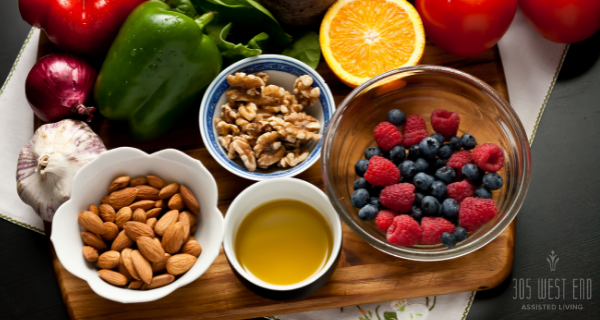If you suffer from stiff, swollen joints caused by arthritis, you aren’t alone. The Centers for Disease Control and Prevention estimates that over 54 million Americans have some form of arthritis. Osteoarthritis is the most common form of arthritis and occurs when the cushioning between your joints breaks down. Rheumatoid arthritis is an autoimmune condition where the body attacks your joints. Left untreated, arthritis can lead to joint deformity and decreased mobility.
Unfortunately, there is no cure for arthritis, but medication, as well as certain lifestyle adjustments can help you manage symptoms. For instance, consuming a diet rich in inflammation-fighting foods, may help reduce joint pain, lower inflammation, and keep you active.
Here are seven of the best foods to eat if you have arthritis.
Foods to Enjoy if You Have Arthritis
While there isn’t a specific diet for arthritis, there are plenty of foods that boast anti-inflammatory and pain-relieving properties. The foods listed below are considered beneficial if you have osteoarthritis or rheumatoid arthritis because they are rich in omega-3 fatty acids, as well as vitamins and antioxidants. Be sure to check with your doctor before making any changes to your diet.
1. Fish
Omega-3 is an essential fat that . Fish like salmon, tuna, trout, and herring are all great sources of two types of omega-3 fatty acids -- DHA and EPA. Research suggests that omega-3 fatty acids offer numerous health benefits, including less inflammation. Experts recommend eating two servings per week.
2. Garlic, Onions and Leeks
Garlic, onions, and leeks are members of the allium family, and high in quercetin, an antioxidant. Similar to ibuprofen and aspirin, quercetin appears to suppress inflammatory chemicals.
Not a fan of garlic breath? Kale, apples, and cherry tomatoes are also good sources of quercetin.
3. Ginger and Turmeric
Featured prominently in Asian and Indian cuisines, ginger and turmeric both contain powerful inflammation-fighting compounds. Gingerol, the active ingredient in ginger, may be beneficial in lowering two key inflammatory markers, while curcumin, the active ingredient in turmeric, may be as effective as ibuprofen and aspirin. Ginger and turmeric also appear to be successful in relieving pain – including the pain caused by arthritis.
4. Vegetables
Mom is right – eating your veggies is good for you! Vegetables like bell peppers, kale, spinach, Brussel sprouts, and broccoli are packed with nutrients – including vitamins C and K. In addition to supporting your immune system, vitamin C also helps boost collagen production. Cartilage – the spongy cushion between your joints – is mostly collagen.
5. Green Tea
One of least processed types of tea, green tea is packed with antioxidants, as well as polyphenols. A plant-based compound, polyphenols offer numerous health benefits, including reducing inflammation. EGCG, another natural compound also found in green tea, .
6. Olive Oil
A key component of the Mediterranean diet, olive oil is high in oleic acid, as well as omega-3 and omega-6 fatty acids. Oleic acid reduces inflammation markers, while oleocanthal – an antioxidant – offers similar inflammation-fighting abilities to ibuprofen.
7. Nuts and Seeds
An excellent source of omega-3 fatty acids, nuts and seeds are also packed with protein and fiber. Omega-3 fatty acids can help lower the production of substances linked to inflammation, and studies suggest it may improve bone strength too. Walnuts, almonds, pistachios, chia seeds, and pumpkin seeds are all great choices. Toss into your morning oatmeal or smoothie, sprinkle over salad, or enjoy as a snack.
Foods to Limit if You Have Arthritis
Just as there are foods that may help reduce inflammation, there are certain foods that can cause inflammation. Healthline recommends avoiding the following foods if you have osteoarthritis or rheumatoid arthritis:
- Sugar. Often found in sweetened beverages and desserts, added sugars may cause low-grade inflammation. Several studies also suggest that sugar may exacerbate rheumatoid arthritis symptoms.
- Processed and red meats. Research has shown that individuals who regularly consume processed and red meats tend to have high inflammatory markers.
- Processed foods. Since processed foods typically contain high amounts of salt and sugar, it is best to limit your intake if you have arthritis.
More Health and Nutrition Resources
If you found these tips helpful, read more about simple exercises you can do in smaller spaces, or strategies for fueling your body before, during, and after exercise.






